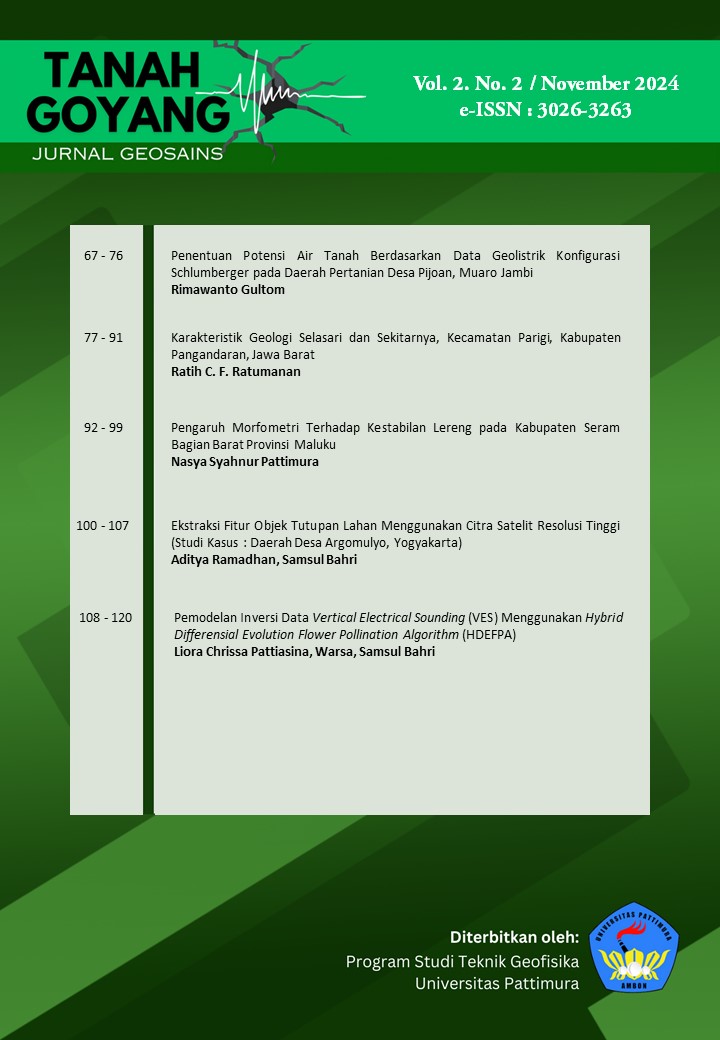Pemodelan Inversi Data Vertical Electrical Sounding (VES) Menggunakan Hybrid Differensial Evolution Flower Pollination Algorithm (HDEFPA)
Abstract
Geoelectric Resistivity is a geophysical method for mapping subsurface resistivity. Vertical Electrical Sounding (VES) is often used because of its ease in providing information on vertical lithological distribution. Modeling inversion of VES data is a complex challenge due to the non-linear relationship between data and model parameters. This research uses the Hybrid Differential Evolution Flower Pollination Algorithm (HDEFPA) as a global optimization method to overcome this problem. HDEFPA combines Flower Pollination (FPA) and Differential Evolution (DE) algorithms, which have both global and local search capabilities. Tests were carried out with synthetic VES data on two-layer, three-layer (K-type and H-type), and four-layer earth models. In addition, field data from seawater intrusion in Pelauw, Maluku, Indonesia were used. The results show that HDEFPA is superior to FPA and single DE in fast convergence and fewer iterations. The HDEFPA algorithm successfully validates field data, producing reliable and accurate results. This research provides insight into the advantages of global optimization methods over local inversion methods in inversion modeling of VES data.
Downloads
References
Abdel Zaher, M., Younis, A., Shaaban, H., & Mohamaden, M. I. I. (2021). Integration of geophysical methods for groundwater exploration: A case study of El Sheikh Marzouq area, Farafra Oasis, Egypt. Egyptian Journal of Aquatic Research, 47(2), 239–244. https://doi.org/10.1016/j.ejar.2021.03.001
Alarifi, S. S., Abdelrahman, K., & Hazaea, B. Y. (2022). Depicting of groundwater potential in hard rocks of southwestern Saudi Arabia using the vertical electrical sounding approach. Journal of King Saud University - Science, 34(7), 102221. https://doi.org/10.1016/j.jksus.2022.102221
Ammar, A. I., Gomaa, M., & Kamal, K. A. (2021). Applying of SP, DC-Resistivity, DC-TDIP and TDEM soundings in high saline coastal aquifer. Heliyon, 7(7), e07617. https://doi.org/10.1016/j.heliyon.2021.e07617
Arunbose, S., Srinivas, Y., & Rajkumar, S. (2021). Efficacy of hydrological investigation in Karumeniyar river basin, Southern Tamil Nadu, India using vertical electrical sounding technique: A case study. MethodsX, 8. https://doi.org/10.1016/j.mex.2021.101215
Asare, A., Appiah-Adjei, E. K., Owusu-Nimo, F., & Ali, B. (2022). Lateral and vertical mapping of salinity along the coast of Ghana using Electrical Resistivity Tomography: The case of Central Region. Results in Geophysical Sciences, 12, 100048. https://doi.org/10.1016/j.ringps.2022.100048
Bahri, S., Ramadhan, A., & Zulfiah. (2023). Investigation of Groundwater Quality using Vertical Electrical Sounding and Dar Zarrouk Parameter in Leihitu, Maluku, Indonesia. Journal of Geoscience, Engineering, Environment, and Technology, 8(3), 221–228. https://doi.org/10.25299/jgeet.2023.8.3.12976
Bahri, S., Tualepe, D., Batlolona, Y. T., Ramadhan, A., & Parnadi, W. W. (2024). Vertical electrical sounding method and Dar Zarrouk analysis to identify the distribution of seawater intrusion in Pelauw Village, Maluku. Journal of Degraded and Mining Lands Management, 11(4), 6089–6097. https://doi.org/10.15243/jdmlm.2024.114.6089
Cui, Y., Zhang, L., Zhu, X., Liu, J., & Guo, Z. (2020). Inversion for magnetotelluric data using the particle swarm optimization and regularized least squares. Journal of Applied Geophysics, 181, 104156. https://doi.org/10.1016/j.jappgeo.2020.104156
Folorunso, A. F. (2021). Mapping a spatial salinity flow from seawater to groundwater using electrical resistivity topography techniques. Scientific African, 13, e00957. https://doi.org/10.1016/j.sciaf.2021.e00957
Hapsoro, C. A., Srigutomo, W., Purqon, A., Warsa, W., Sutarno, D., & Kagiyama, T. (2021). Global Inversion of Grounded Electric Source Time-domain Electromagnetic Data Using Particle Swarm Optimization. Journal of Engineering and Technological Sciences, 53(1), 210101. https://doi.org/10.5614/j.eng.technol.sci.2021.53.1.1
H.Grandis, & Sungkono. (2022). Modified symbiotic organism search (SOS) algorithm for controlled-source audio-frequency magnetotellurics (CSAMT) one-dimensional (1D) modelling. J.Earth Syst.Sci, 131(1), 61.
Junian, W. E., & Grandis, H. (2023). HYBRID PARTICLE SWARM OPTIMIZATION AND GREY WOLF OPTIMIZER ALGORITHM FOR CONTROLLED SOURCE AUDIO-FREQUENCY MAGNETOTELLURICS (CSAMT) ONE-DIMENSIONAL INVERSION MODELLING. Rudarsko-geološko-naftni zbornik, 38(3), 65–80. https://doi.org/10.17794/rgn.2023.3.6
Kaplanvural, İ., Pekşen, E., & Özkap, K. (2020). 1D waveform inversion of GPR trace by particle swarm optimization. Journal of Applied Geophysics, 181, 104157. https://doi.org/10.1016/j.jappgeo.2020.104157
Kazakis, N., Pavlou, A., Vargemezis, G., Voudouris, K. S., Soulios, G., Pliakas, F., & Tsokas, G. (2016). Seawater intrusion mapping using electrical resistivity tomography and hydrochemical data. An application in the coastal area of eastern Thermaikos Gulf, Greece. Science of The Total Environment, 543, 373–387. https://doi.org/10.1016/j.scitotenv.2015.11.041
Mahmud, S., Hamza, S., Irfan, M., Huda, S. N., Burke, F., & Qadir, A. (2022). Investigation of groundwater resources using electrical resistivity sounding and Dar Zarrouk parameters for Uthal Balochistan, Pakistan. Groundwater for Sustainable Development, 17, 100738. https://doi.org/10.1016/j.gsd.2022.100738
Neri, F., & Tirronen, V. (2010). Recent advances in differential evolution: a survey and experimental analysis. Artificial Intelligence Review, 33(1–2), 61–106. https://doi.org/10.1007/s10462-009-9137-2
Oyeyemi, K. D., Aizebeokhai, A. P., Ukabam, C. S., Kayode, O. T., Olaojo, A. A., & Metwaly, M. (2023). Nonlinear inversion of electrical resistivity sounding data for multi-layered 1-D earth model using global particle swarm optimization (GPSO). Heliyon, 9(6), e16528. https://doi.org/10.1016/j.heliyon.2023.e16528
Patria, A., Tsutsumi, H., & Natawidjaja, D. H. (2021). Active fault mapping in the onshore northern Banda Arc, Indonesia: Implications for active tectonics and seismic potential. Journal of Asian Earth Sciences, 218, 104881. https://doi.org/10.1016/j.jseaes.2021.104881
Pownall, J. M., Hall, R., & Watkinson, I. M. (2013). Extreme extension across Seram and Ambon, eastern Indonesia: evidence for Banda slab rollback. Solid Earth, 4(2), 277–314. https://doi.org/10.5194/se-4-277-2013
Srigutomo, W., Hapsoro, C. A., Purqon, A., Warsa, Sutarno, D., & Kagiyama, T. (2021). Nonlinear Inversion Using Very Fast Simulated Annealing for Horizontal Electric Dipole Time-Domain Electromagnetic Data. Journal of Electromagnetic Engineering and Science, 21(5), 379–390. https://doi.org/10.26866/jees.2021.5.r.46
Storn, R., & Price, K. (1997a). Differential Evolution - A Simple and Efficient Heuristic for Global Optimization over Continuous Spaces. Journal of Global Optimization, 11(4), 341–359. https://doi.org/10.1023/A:1008202821328
Storn, R., & Price, K. (1997b). Differential evolution-a simple and efficient heuristic for global optimization over continuous space. Journal of Global Optimization, 11(4), 341–359. https://doi.org/10.1023/A:1008202821328
Talbi, E.-G. (2002). A Taxonomy of Hybrid Metaheuristics. Journal of Heuristics. Journal of Heuristics, 8(5), 541–564. https://doi.org/10.1023/A:1016540724870
Tjokrosaputro, S., Rusmana, E., & Achdan, A. (1993). Peta geologi lembar Ambon, Maluku [peta] = Geological map of the Ambon sheet, Maluku / oleh S. TJokrosaputro, E. Rusmana dan A. Achdan.
Turan-Karaoğlan, S., & Göktürkler, G. (2021). Cuckoo Search Algorithm for model parameter estimation from self-potential data. Journal of Applied Geophysics, 194, 104461. https://doi.org/10.1016/j.jappgeo.2021.104461
Wahyudi, E. J., Santoso, D., Kadir, W. G. A., & Alawiyah, S. (2014). Designing a Genetic Algorithm for Efficient Calculation in Time-Lapse Gravity Inversion. Journal of Engineering and Technological Sciences, 46(1), 58–77. https://doi.org/10.5614/j.eng.technol.sci.2014.46.1.4
Wang, J., & Tan, Y. (2005). 2-D MT inversion using genetic algorithm. Journal of Physics: Conference Series, 12, 165–170. https://doi.org/10.1088/1742-6596/12/1/016
Wang, Y., Wang, H., Wu, X., Chen, K., Liu, S., & Deng, X. (2021). Near-surface velocity inversion from Rayleigh wave dispersion curves based on a differential evolution simulated annealing algorithm. Artificial Intelligence in Geosciences, 2, 35–46. https://doi.org/10.1016/j.aiig.2021.10.001
Widodo, W., Raflesia, F., Awaliyah, S., Setianingsih, S., Santoso, D., Parnadi, W., & Fatkhan, F. (2022). Flower Pollination and Elitism Algorithms for Inversion of TDEM Data. Journal of Mathematical and Fundamental Sciences, 54(1), 121–137. https://doi.org/10.5614/j.math.fund.sci.2022.54.1.7
Yang, X.-S. (2012). Flower Pollination Algorithm for Global Optimization (hlm. 240–249). https://doi.org/10.1007/978-3-642-32894-7_27
Yang, X.-S., & Karamanoglu, M. (2020). Nature-inspired computation and swarm intelligence: a state-of-the-art overview. Dalam Nature-Inspired Computation and Swarm Intelligence (hlm. 3–18). Elsevier. https://doi.org/10.1016/B978-0-12-819714-1.00010-5
Yildizdan, G., & Baykan, Ö. K. (2020). A novel modified bat algorithm hybridizing by differential evolution algorithm. Expert Systems with Applications, 141, 112949. https://doi.org/10.1016/j.eswa.2019.112949








1.png)

